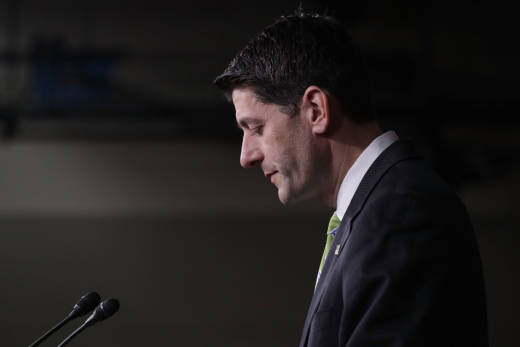"I will not sugarcoat this," the House Speaker conceded. "This is a disappointing day for us."
The way forward for Republicans on exactly how to replace Obamacare remains murky -- or if they even will try again.
"Obamacare is the law of the land. It is going to remain the law of the land," Ryan admitted. "We're going to be living with Obamacare for the foreseeable future."
But President Trump tried to spin the setback as a defeat for Democrats who wouldn't cross the aisle to support the bill -- despite making entreaties to the minority party.
"The best thing we can do politically speaking is let Obamacare explode," he argued in the Oval Office. "It is exploding right now."
Ryan had already delayed the bill a day to try and muster support. President Trump delivered an ultimatum to House Republicans -- pass the GOP replacement, the American Health Care Act, or Obamacare will stand.
Ultimately, the votes never came together for a fractured GOP caucus, and Ryan traveled to the White House to tell President Trump he was pulling the bill.
Democrats, meanwhile, were more than happy to take a victory lap in the GOP's defeat. House Minority Leader Nancy Pelosi, whose caucus was decimated in 2010 after the health care bill was passed, appeared flanked by Democratic leadership to gloat just a day after the seventh anniversary of the bill's signing.
"It's pretty exciting for us," the California Democrat said, beaming. "Yesterday the anniversary. Today a victory for us."
The inability of Republican to reach consensus on a bill, given its control of the House, Senate and White House, badly hurts its image as a party that can govern, and Ryan admitted as much on Friday.
The GOP has vowed repeatedly over the past eight years that it would repeal and replace Obamacare. The legislative stalemate endangers Trump's and the GOP's agenda and casts a cloud over the legislative path forward after an election waged almost entirely as the antithesis to a progressive agenda enacted by former President Barack Obama, Trump's predecessor.
The risks were high for President Trump on the bill. He has hyped a brand of someone able to strike the best deals. Being unable to get this through, after giving an ultimatum to congressional Republicans Thursday, raises questions about just how good a dealmaker he is and underscores his lack of legislative and policy experience upon entering the White House.
Vice President Mike Pence, who canceled a trip out of Washington, had hoped to make one last sale in a meeting with the roughly 40-member, hard-line conservative Freedom Caucus, which had also refused to budge from its ideological objections to the bill.
In an attempt to win the caucus over, an amendment was added to the bill late Wednesday night, cutting essential health benefits, 10 types of medical care that insurance companies are required to cover. The Freedom Caucus wants to see premiums come down and believes cutting benefits is the way to do that.
But that also had an effect on moderates. For example, Rep. Barbara Comstock, R-Va., who represents a swing district in the D.C. suburbs, said she wouldn't back the bill, joining more moderate Republicans who are top 2018 Democratic targets and don't want to take a tough vote that might come back to bite them during the midterms.
Rep. David Joyce, R-Ohio, another centrist Republican, announced he wouldn't support the bill either, saying in a statement that the GOP's replacement plan was no better than Obamacare.
And House Appropriations Committee Chairman Rodney Frelinghuysen, R-N.J., also broke ranks with GOP leadership on Friday, announcing that he was a no vote. His reasoning: The current bill adds too many new costs and barriers, along with taking away benefits requirements.
White House press secretary Sean Spicer had maintained at his daily briefing that a vote was still slated for this afternoon. He said Trump had "left everything on the field" to try to woo Republican members, having contacted over 120 members. But his tone and tense were notable.
Spicer wouldn't concede that the bill might fail, but did admit that "at the end of the day, you can't force somebody to do something."
He added, "At the end of the day, this isn't a dictatorship."
Copyright 2017 NPR. To see more, visit http://www.npr.org/.
